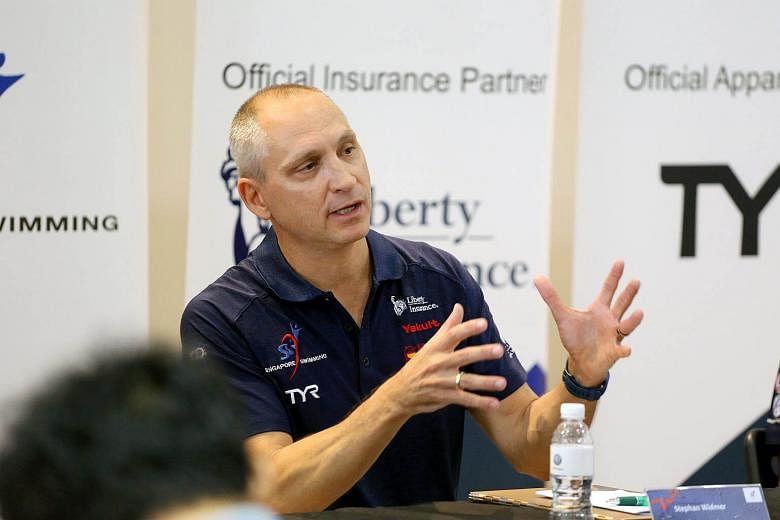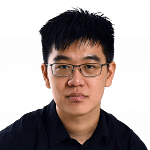SINGAPORE - Theoretical knowledge may be what Stephan Widmer was hired to infuse into Singapore but it is insufficient for the Republic's swimmers to break onto the world stage.
Discussing his strategy for elevating the sport's standards here, the national swimming head coach and performance director used promising 14-year-old Zachary Tan, who set five Under-14 national records last year, to illustrate his point.
"He is someone who has to learn how to travel, how to go through time zones, how to adapt to different conditions as quickly as possible," Widmer told The Straits Times.
"So we sent him to some (Fina) World Cup events last August because the only way to gain this experience is to go through it. You can't read this stuff out of a book."
Competitions are one of the five areas Widmer identified as part of the masterplan he is in the process of implementing six months into the job. The other four are athletes, coaches, support staff and parents.
Said the 50-year-old: "It's know-how and belief we have to create. We've got great facilities, the money for the performance side is good, the government is so supportive, so we have to find a way to improve the people on the ground constantly, to give them the belief."
Unlike his predecessors, Widmer's energies are primarily directed at coaching development, with national training centre head coach Gary Tan handling the bulk of the day-to-day national team coaching duties.
"The idea is to grow a larger group of better-educated local coaches within the next two to three years, and that's why I'm not working directly with the swimmers," explained the Switzerland-born Australian.
He said that coaches would be sorted into four tiers, with the approach differing for each group.
In the top tier, the high-performance coaches who have produced SEA Games medallists or Asian Games finalists will receive the most individual attention and mentorship from Widmer and Singapore Swimming Association technical director Sonya Porter.
"The main thing will be learning to individualise preparations more, so it's about looking at the history of the athlete. What are their splits, what do world class standards look like, what can they handle and then designing sessions and sets that replicate race stresses and pace," said Widmer, who has coached Olympic champions Libby Trickett, Leisel Jones and Jessicah Schipper.
Widmer also plans to identify a group of four to six younger coaches who will be placed on the fast track in order to accelerate the growth of the talent pool.
"What I'm looking for are specialists, specialists in sprinting but also specialists in coaching female swimmers," he said. "Obviously half the swimmers are females but the higher percentage of coaches are male so we hope to have some talented female coaches join the game and teach us a few things."
The remaining two tiers comprise grassroots coaches at the learn-to-swim and developmental levels, who will be reached primarily through coaches' workshops. This group largely oversees swimmers from six to 12 years of age.
The skills imparted to them will also be different, focusing more on their roles as teachers instead of coaches, Widmer explained.
Former national swimmer and Olympian Mark Chay, who coaches at swimming academy X Lab, was pleased with the progress. He said: "What Stephan and Sonya have done is to create a lot of talk between them and the next generation of local coaches like Gary, Richard (Chng, AquaTech head coach) and Leonard (Tan, National Youth Sports Institute head coach).
"One of things we've been talking about is how we can develop swimmers' balance and awareness in the water. There's normally a lot of focus on conditioning but when a kid has a growth spurt in secondary school, he's essentially swimming in a different body every few months."
Widmer aims to organise 25 workshops this year and is looking to add more physiotherapists or sports science professionals with specialised swimming knowledge to the national set-up in order to come up with more specific fitness and rehabilitation plans for individual athletes.
Educating swimmers' parents is important too, as coaches' time with athletes is limited, especially the younger swimmers.
Said Widmer: "We want to guide parents in specific areas like nutrition and sleep, and also keep them informed as to why certain changes happen at different stages of the athlete's development."
But he emphasised again that knowing enough to reach the world stage is but half the journey, pointing to Joseph Schooling's University of Texas coach Eddie Reese, who had guided Schooling at the 2016 Rio Olympics, as a role model with both knowledge and self-belief.
Said Widmer: "Imagine you were Jo's coach then and there's the US team arriving... Would you feel comfortable, confident, that you can handle this no matter what's thrown at you? That's the level of people we have to create within this nation.
"I don't know how many coaches out there will produce a future Olympic medallist but I hope we can guide them towards it."


